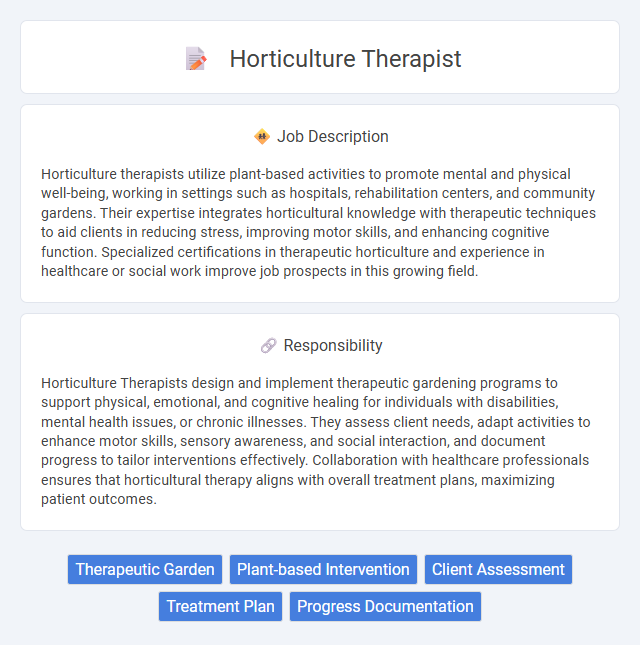
Horticulture therapists utilize plant-based activities to promote mental and physical well-being, working in settings such as hospitals, rehabilitation centers, and community gardens. Their expertise integrates horticultural knowledge with therapeutic techniques to aid clients in reducing stress, improving motor skills, and enhancing cognitive function. Specialized certifications in therapeutic horticulture and experience in healthcare or social work improve job prospects in this growing field.
People experiencing stress, anxiety, or physical disabilities are likely to benefit from a career as a Horticulture Therapist, given the therapeutic nature of plant-based activities. Individuals with a passion for nature, patience, and strong interpersonal skills may find themselves well-suited for this profession. Those who prefer solitary work or lack empathy might encounter challenges adapting to the collaborative and empathetic demands of the role.
Qualification
A Horticulture Therapist typically requires a bachelor's degree in horticulture therapy, horticulture, psychology, or a related field, with certification from a recognized body such as the American Horticultural Therapy Association (AHTA) enhancing job prospects. Essential qualifications include knowledge of therapeutic techniques, plant science, and experience in developing and implementing horticultural programs for diverse populations. Strong interpersonal skills and a background in healthcare or social services are often preferred to effectively support clients' physical and mental well-being through plant-based therapies.
Responsibility
Horticulture Therapists design and implement therapeutic gardening programs to support physical, emotional, and cognitive healing for individuals with disabilities, mental health issues, or chronic illnesses. They assess client needs, adapt activities to enhance motor skills, sensory awareness, and social interaction, and document progress to tailor interventions effectively. Collaboration with healthcare professionals ensures that horticultural therapy aligns with overall treatment plans, maximizing patient outcomes.
Benefit
Horticulture therapy may provide significant mental health benefits by promoting relaxation and reducing stress levels. Engaging with plants and nature could enhance emotional well-being and improve cognitive function for individuals undergoing therapy. Clients might experience increased motivation and social interaction, contributing to overall quality of life improvements.
Challenge
Challenges in a horticulture therapist job may involve adapting therapeutic horticulture activities to meet the diverse needs of clients with varying physical and cognitive abilities. There is a probability of encountering obstacles related to creating accessible outdoor environments while ensuring safety and engagement. Managing client progress and setbacks in a therapeutic context could require strong problem-solving and patience.
Career Advancement
Horticulture Therapists gain career advancement by acquiring certifications such as the Registered Horticultural Therapist (RHT) credential, which enhances professional credibility and job opportunities. Progression often leads to leadership roles in therapeutic gardens, wellness centers, or healthcare facilities, where specialists design and manage programs that utilize plant-based interventions. Continuing education in plant sciences and therapy techniques, alongside experience in clinical or community settings, supports advancement into higher-paying positions or specialized consulting roles.
Key Terms
Therapeutic Garden
Horticulture therapists design and facilitate activities in therapeutic gardens to promote physical, emotional, and cognitive healing for diverse populations. These specialized gardens incorporate sensory plants, accessible pathways, and calming natural elements to support rehabilitation and enhance well-being. Through targeted horticultural interventions, therapists help reduce stress, improve motor skills, and foster social interaction within these healing environments.
Plant-based Intervention
Horticulture therapists use plant-based interventions to improve mental health and physical well-being by engaging clients in gardening and nature activities. These interventions promote sensory stimulation, reduce stress, and enhance cognitive function through hands-on interaction with plants. Research shows that structured plant-based therapy supports rehabilitation and fosters emotional resilience in diverse populations.
Client Assessment
Horticulture therapists conduct detailed client assessments to understand physical, psychological, and social needs, tailoring therapeutic gardening activities accordingly. They utilize tools such as standardized assessment scales and observational evaluations to measure client abilities, preferences, and progress. Effective client assessment guides personalized intervention plans that promote mental health, cognitive skills, and physical rehabilitation.
Treatment Plan
A Horticulture Therapist develops personalized treatment plans integrating plant-based activities to improve clients' mental, physical, and emotional well-being. These plans often include gardening tasks tailored to individual abilities, fostering sensory stimulation, stress reduction, and motor skill enhancement. Careful assessment and goal setting ensure therapy aligns with patients' therapeutic needs and progress is regularly monitored for effectiveness.
Progress Documentation
Horticulture therapists document client progress by recording improvements in physical, cognitive, and emotional health through structured therapy sessions using plants and garden activities. Detailed progress documentation includes session notes, behavioral changes, and goal achievement metrics to tailor interventions effectively. Accurate record-keeping supports treatment evaluation, enhances communication with healthcare teams, and ensures compliance with clinical standards.
 kuljobs.com
kuljobs.com